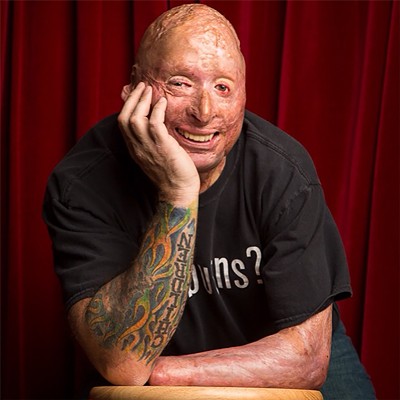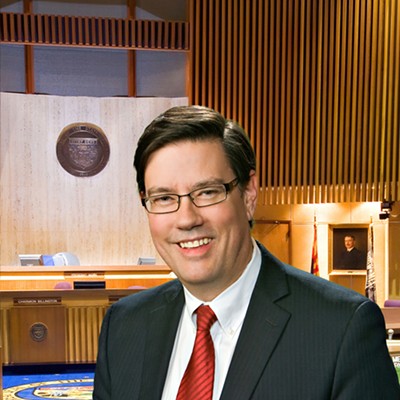PRIMARY MAKEOVER
Arizona politics took a rightward tilt in the last election, and as a result, Republicans now control two-thirds of the seats in the Arizona Legislature, and nearly every statewide office, save for a few seats on the Arizona Corporation Commission.
So it's hardly surprising to see that folks who aren't on the conservative end of the political spectrum are trying to find a way to change the system.
The latest effort comes from the Open Government Committee, a group that wants to give Arizona voters a chance to dump the current partisan-primary system that helps elect the governor, the attorney general, state lawmakers and other state officials.
The Open Government Committee has launched an initiative for the 2012 ballot, called the Open Elections/Open Government Act. It would create a new primary system in which all candidates run in a single primary, with the two top vote-getters moving on to the general election.
Under the current system, Republicans run in a Republican primary; Democrats run in a Democratic primary; Greens run in a Green primary; and Libertarians run in a Libertarian primary. The winners of each of those races, along with any qualifying independent candidates, go on to face each other in the general election.
Paul Johnson, the former Phoenix mayor who is chairing the committee, says that changing the system would force candidates to stop playing to radical political fringes in order to win primaries.
"Candidates will have to appeal to independent voters and voters on the other side, and more moderates will win," says Johnson, a former Democrat who registered as an independent after two unsuccessful bids for governor in 1994 and 1998.
Johnson suggests that the change to a blanket primary might have the biggest impact in legislative districts that are now particularly lopsided in the direction of one party. For example, a legislative district that's heavily Republican might end up nominating two Republicans to face each other in a general election for one state Senate seat.
In that kind of scenario, Johnson posits, general-election voters might go with the more-moderate Republican.
"In a district that is gerrymandered (in favor of) Democrats or Republicans, you will now have competition in the runoff," he says.
Johnson says that in more-competitive districts, where voter registration is more closely split between Democrats and Republicans, you might not see a very big change, because the two top vote-getters are likely to be a Republican and a Democrat, anyway.
"The outcome will be the same," Johnson says.
It's certainly true that many voters appear to be disgusted with both political parties these days. The number of independent voters continues to climb, and a 2010 Morrison Institute survey showed overwhelming support for non-partisan races in general, with more than three-fourths of those surveyed supporting an open primary featuring all candidates, and more than 60 percent supporting the idea of stripping away party ID on the ballot.
However, the Open Elections/Open Government initiative would allow candidates to keep a party label next to their names on the ballot.
We confess we are skeptical that the proposed initiative would actually change many election outcomes. We've seen reforms in the past—Clean Elections, for example—that have backfired on their sponsors.
Also, one huge problem would remain: Most voters don't care enough to participate in primary elections. It's hard to see how this would change that dynamic.
DASH FOR CASH
With just a month or so left before the Nov. 8 election, the Democrats in this year's Tucson City Council races continue to hold a huge fundraising advantage over their GOP opponents, according to campaign-finance reports filed late last week.
As we mention in this week's feature story ("Municipal Melee"), Democratic mayoral candidate Jonathan Rothschild has raised 12 times the amount of money that Republican Rick Grinnell has raised.
Between Aug. 18 and Sept. 19, Rothschild raised $42,411. That's more than twice the amount of money that Grinnell has raised during his entire campaign.
Grinnell—who got into the race as a write-in candidate during the August primary election after the original GOP mayoral candidates were kicked off the ballot—has raised just $20,365. That includes $4,590 he raised between Sept. 7 and Sept. 19, which was the end of the most-recent filing period.
Grinnell had spent $14,480 and had just $5,885 left in bank.
Rothschild, who has been assembling his campaign for more than a year, had raised a total of $257,033 as of Sept. 19, which is more private dollars than any mayoral candidate has raised in Tucson's history. He had spent $112,569, and still had $144,463 left in the bank.
Green Party candidate Mary DeCamp reported raising $3,445, and had $1,808 in the bank.
The fundraising figures in the City Council races are also lopsided.
Over in Ward 4, Democratic Councilwoman Shirley Scott has a nearly 3-to-1 advantage over GOP challenger Tyler Vogt.
Scott had raised $90,585, including $40,235 in public matching funds. She still had $54,199 on hand as of the end of the reporting period.
Vogt had raised $18,389 in private contributions and received $13,134 in matching funds. He had spent $14,115 as of the end of the reporting period.
In Ward 2, Democratic Councilman Paul Cunningham has raised nearly four times as much as Republican opponent Jennifer Rawson.
Cunningham reported raising $61,887, including $25,431 in matching funds. He had spent $32,902, leaving him with $28,984 in the bank at the end of the reporting period.
Rawson had raised $16,824, and still had $8,308 left. She has applied for matching funds and is awaiting the conclusion of an audit before she can receive those dollars.
Council candidates who participate in the matching-funds program agree to limit their spending to $108,615.
FOUR INTO ONE
The GOP race to replace Pima County Supervisor Ann Day, a Republican who is retiring after three terms on the board, is becoming a crowded affair.
Last week, Stuart McDaniel announced he'd seek the District 1 seat, which represents the Catalina foothills and Oro Valley on the five-member Board of Supervisors.
McDaniel, who has worked as a mortgage banker, served as deputy campaign manager for Republican Jesse Kelly's unsuccessful congressional campaign against Congresswoman Gabrielle Giffords last year.
State Rep. Vic Williams is also considering a run for the seat, although he can't announce any plans until Jan. 1 without giving up his legislative seat under Arizona's resign-to-run law.
Tea Party activist Ally Miller has already launched a website to promote her nascent candidacy.
Charlie Bowles, a vice president of marketing and sales for legendary land speculator Don Diamond's Diamond Ventures, is also considering a run.
GET YOUR DEBATE ON
The first televised mayoral debate is coming up next week, courtesy of Arizona Public Media. Democrat Jonathan Rothschild, Republican Rick Grinnell and Green Mary DeCamp will face off for a half-hour on KUAT Channel 6's Arizona Illustrated, airing at 6:30 p.m., next Thursday, Oct. 13.














